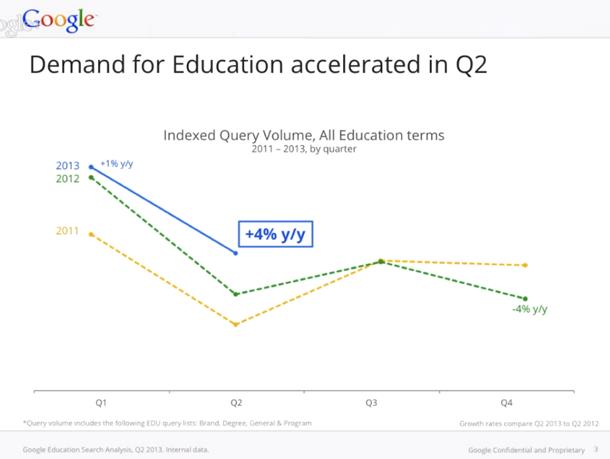Deciding where to most strategically allocate your limited higher ed marketing budgets to compete effectively is tough and getting tougher. Since watching Google’s Q2 Higher Education Search Analysis Hangout video, (released in mid-August), I’ve been thinking a lot about what the search trends released in this report can tell us about how to be more effective with our marketing efforts this fall. A few thoughts come to mind.
Before we start, it is important to note that Google releases these stats to serve their interests, as any reasonable shareholder-driven corporation would. Generally speaking that interest is to encourage PPC advertising, which is where they make their money. PPC advertising, in the right context, is a powerful marketing tool. I believe it should be nested within a balanced mix of online, offline, strategic and tactical elements to be most effective. That’s just to say that my take on their stats may be a bit different than theirs, given my personal and business agenda. And please forgive me if I speculate a bit on some topics not specifically covered by their stats. I just can’t help myself.
Source: Google’s Q2 Higher Education Search Analysis (See link above)
So search queries for all higher education terms is up by 4% . That’s good news in general but does not specifically mean more students are looking for a college to attend. Two important elements impacting this are : 1) MOOC related terms, (which tended to be MOOC brand names) are up 142% year over year and 2) Mobile searching is up 49% year over year. The second group likely includes more prospects but when considering this number it is important to understand that mobile search intent usually differs from traditional desktop searching, often with lower lead quality. So yes, the number is up, but I think we need to translate that carefully, if we are looking for insight into prospective student behavior.
The following slide drills down a level into higher ed search terms and is really quite interesting. One thing I was surprised to see was that relative volume of branded search terms was roughly three times the volume of program, degree and other general search terms, combined. So, clearly people are searching for information, specifically about a college or university that they already know about, in much greater volume than they are with searches where they might look for a specific program, say “accounting degree”, but across many possible institutions. For me, this data brings home the really critical significance of investing in SEO to your overall marketing strategy. I would argue that your best opportunity to dominate search rankings is on these branded searches that include your school’s name. Optimize your pages for SEO, get a vibrant content strategy in place to serve the interests of your audience and the rankings, traffic, (leads and ultimately, registrations), will follow.
Source: Google’s Q2 Higher Education Search Analysis (See link above)
Engaging search traffic at the program, degree and general keyword level is definitely much more competitive, and the more likely place in the search ecosystem that PPC activity is targetted. If you have new PPC activity planned, or if it’s already part of your marketing mix then you need to be aware that PPC marketing continues to get more competitive and more expensive.
Source: Google’s Q2 Higher Education Search Analysis (See link above)
Over the Q2 report period, total PPC clicks were reported down by 7%, with a corresponding 12% increase in cost. I find it hard to understand why PPC clicks are down, unless overall PPC advertising budgets across higher ed are down. My first guess would be that due to regulatory pressure and scrutiny on the for-profit industry in the states, that some institutions may have backed off their PPC activities for a while. My second guess would be that because the economy has been improving in the US, that prospective student interest may be waning a bit in lieu of an improving job prospects.
I think that the moral of the story here is that if you are going to use PPC to generate leads, then you have to be at the top of your game, ( ie no dabbling). Build your expertise in best practices in Adwords campaign development, in landing page design and in A/B testing to make sure you are getting the maximum ROI out of your PPC investment.
One element that isn’t really addressed in the report is the symbiotic effect that you can get from impact of investing in SEO and PPC at the same time. We published a blog post about a year ago related to this subject entitled “PPC vs SEO: Where’s your Spend” that has been pretty popular. The main points were 1) Organic search gets the most clicks, 2) PPC marketing is a very effective marketing tool for lead generation and 3) PPC and organic produce leads of different quality, 4) the sum of SEO and PPC investment is greater than the parts. A recently added report to Adwords now supports this approach to paid and organic co-optimization, See further discussion of the Adwords Paid and Organic Report in this MOZ blog post.
Understanding the nuances of Google’s world of search is more important today than it has ever been. More options, more players and more competition are pushing everyone to be at the top of their game to get their marketing jobs done.I would like to say thanks to Google for providing this insight into their data on the industry. We need more of this in the future. Please keep it coming.
What is your take on the Google Education Search Analysis report? If given the chance to ask, what other kinds of data would you like to see Google release in the future about search trends in the higher ed market?








